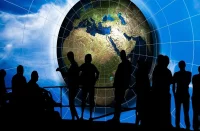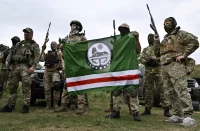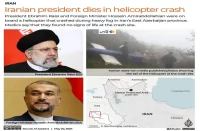Stanislav Ivanov (Russia)
The new terrorist attack in Russia on January 24, 2011 justifiably angered Russians and the entire world community. About 200 people suffered (35 of whom were killed) an attack by a suicide bomber in the passenger arrival lounge at Domodedovo airport. Hardly anyone could remain indifferent to this senseless bloody act committed against the civilians of various countries, nationalities, faiths, sexes and ages who were in the arrival lounge. Along with expressions of grief and words of sympathy for the victims and their families came statements of confidence from Russians and all of progressive humanity that those who organized and carried out this terrorist attack would not escape just retribution. We can say already that the expectations of the terrorists that they would succeed in intimidating Russians and causing panic and chaos in the country have not materialized. This shared misfortune has only rallied society and reminded us that we have to fight for happiness and peace on earth. We are highly appreciative of the recent words of sympathy and support from the leaders of the world’s major powers, public organizations and ordinary citizens on all continents.
However, some “Russian history specialists” and pseudo-political analysts have taken this opportunity to play the anti-Russian card. Their idle speculation and outright lies have sounded a discordant note in the overall influx of letters and telegrams from outside the country expressing solidarity with the Russian people. And while we are used to hostile attacks by Georgian President Mikhail Saakashvili, we find articles written by “specialists on Russia” on the other side of the Atlantic puzzling, to put it mildly.
For example, someone named Fareed Zakaria has an article in the well-known American publication Time Magazine under the title “How Russia Created Its Own Islamic Terrorism Problem,” in which he attempts to criticize both our history and current actions by the Russian authorities in a rather primitive and crude manner. According to him, even George Bush and Tony Blair became accomplices to Moscow’s erroneous policies in the Caucasus because they “reacted to the terrorist incidents in Russia by quickly condemning them and describing them as instances of Islamic terrorism, tied to al-Qaeda and its fanatical vision.” Zakaria himself, apparently, is in no rush to condemn such terrorist attacks, and he lays the blame for them on the Russians themselves.
The author begins his opus by delving awkwardly into the history of the Russian Empire and its relations with Chechnya. Supposedly, “about 200 years ago, the Russian empire began a war of colonial expansion in the tiny area called Chechnya.” Zakaria says nothing about the previous centuries, when Arabs, Persians, Turks, Georgian princes and Mongol Tatars struggled fiercely for dominance. Russia initially tried to establish friendly relations with the local mountain feudal groups by peaceful means without encroaching on their autonomy while the invaders were seeking to conquer, enslave or destroy the tribes. The first Vainakh (Chechen-Ingush) embassy arrived in Moscow as early as 1588, during the reign of Czar Feodor Ivanovich, and Vainakh Prince Shkih-Murza voluntarily accepted Russian citizenship. Russia maintained good, mutually beneficial relations with the Kazakh peoples for a long time. Of course, later there were also periods of mutual hatred, attacks by mountaineers on Russian settlements and reprisals by the Czarist army, as was customary in the world during that period in history. Russia’s actions at the time differed little from those of the British Empire, for example.
Matters here were ambivalent during Soviet times, also. Initially, the Bolsheviks cooperated closely with the mountain peoples of the North Caucasus in fighting the Whites and the Monarchists without encroaching on their independence, customs and traditions. Later, the Caucasians, like all Soviet citizens, experienced every delight of the Bolshevik regime (repressions, forced collectivization, suppression of religion, etc.). A number of peoples, including the Chechens and Ingush, were subjected to forced deportation to Central Asia in 1944. But there were positive developments, as well: the elimination of illiteracy, the social and economic development of the region and acts of heroism during the war against the Fascist invaders.
The new, post-Soviet Russia conducted a proper legal assessment of the misconduct by Soviet authorities, condemned the crimes of the Stalinist regime and rehabilitated its victims. Mr. Zakaria has no moral justification for placing responsibility for political mistakes and crimes committed during the Czarist and Soviet periods on the current Russian authorities.
His accusations concerning the incursion of Russian troops into Chechnya after 1990 are a faux pas, to say the least. Any government faced with rampant crime, terrorist activities and large-scale riots that threatened its national security and territorial integrity would be forced to take adequate measures to protect its constitutional order. Zakaria is hardly authorized to give his opinion of Chechnya’s current regional authorities either: “… a totalitarian regime based on violence… and fear.” We Russians are in a better position to understand the mentality of the Chechens: nothing intimidates them. They are a proud and freedom-loving people, and their right to choose their leader must be respected. Zakaria concludes that “as Russia destroyed Chechnya’s civil society, the place became a wasteland characterized by anarchy and gang warfare.” Exactly the opposite occurred. All of the large gangs were defeated, and the foreign mercenaries and their emissaries were destroyed or forced to flee the republic. The level of terrorist activity in Chechnya decreased by an order of magnitude. Chechnya’s capital, Grozny, has been completely restored. Scientific and educational institutions, hospitals, sports facilities, bridges, roads and mosques have been built everywhere. Agriculture, industry, oil production and infrastructure are all being restored.
Zakaria concludes his article by saying: “…One could argue that the Russian government, far more than Osama bin Laden, has managed through its actions over the past two decades to create the largest and most active new center of Islamic terrorism in the world today.” As the old saying goes, “doesn’t that just take the cake?” I don’t know what Osama bin Laden had to do with it; he hasn’t been heard from in a long time. But Mr. Zakaria certainly has certainly done his bit to justify terrorism. Incidentally, he also coined a new term—“Islamic terrorism.” The fact is that no faithful Muslim has ever justified terrorism and murder in any form. True, there are extremist Islamist groups in the world that may practice terror as a method of warfare. But they have nothing in common with Islam or with Muslims. Terrorists belong to no national or religious communities; they are outside morality, religion and the law.
Time Magazine is unlikely to have improved its rating or image by publishing Zakaria’s decidedly anti-Russian article. Not all of the victims of the terrorist attack have been buried yet; many victims remain in serious condition and are fighting for their lives. Russian authorities are doing everything possible to deal with the consequences of the tragedy and are taking steps to prevent it from happening again; and yet our government is being compared with the world’s top terrorist, Osama bin Laden, who was trained in the bowels of the CIA. That is the height of cynicism!!!
Stanislav Ivanov holds a Candidate of Science (History) degree and is a Senior Fellow at the Center for International Security of the Institute of World Economy and International Relations of the Russian Academy of Sciences.
Source: New Eastern Outlook
RELATED ARTICLE:














Comments